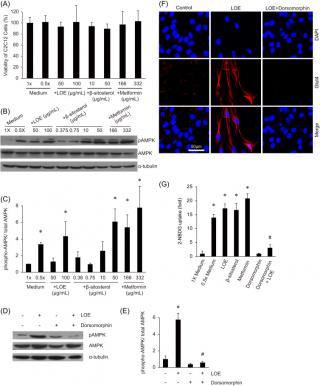Jun, 2017

Ethnopharmacological relevance:
Ludwigia octovalvis (Jacq.) P.H. Raven (Onagraceae) extracts have historically been consumed as a healthful drink for treating various conditions, including edema, nephritis, hypotension and diabetes.
Aim of the study:
We have previously shown that Ludwigia octovalvis extract (LOE) can significantly extend lifespan and improve age-related memory deficits in Drosophila melanogaster through activating AMP-activated protein kinase (AMPK). Since AMPK has become a critical target for treating diabetes, we herein investigate the anti-hyperglycemic potential of LOE.
Materials and methods:
Differentiated C2C12 muscle cells, HepG2 hepatocellular cells, streptozotocin (STZ)-induced diabetic mice and high fat diet (HFD)-induced diabetic mice were used to investigate the anti-hyperglycemic potential of LOE. The open field test and novel object recognition test were used to evaluate spontaneous motor activity and memory performance of HFD-induced diabetic mice.
Results:
In differentiated C2C12 muscle cells and HepG2 hepatocellular cells, treatments with LOE and its active component (β-sitosterol) induced significant AMPK phosphorylation. LOE also enhanced uptake of a fluorescent glucose derivative (2-NBDG) and inhibited glucose production in these cells. The beneficial effects of LOE were completely abolished when an AMPK inhibitor, dorsomorphin, was added to the culture system, suggesting that LOE requires AMPK activation for its action in vitro. In streptozotocin (STZ)-induced diabetic mice, we found that both LOE and β-sitosterol induced an anti-hyperglycemic effect comparable to that of metformin, a drug that is commonly prescribed to treat diabetes. Moreover, LOE also improved glycemic control and memory performance of mice fed a HFD.
Conclusions:
These results indicate that LOE is a potent anti-diabetic intervention that may have potential for future clinical applications.